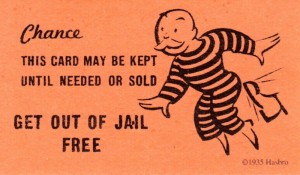 The debate that won’t die. I’ve posted on whether Amazon is a monopoly (it isn’t) here and here. Today Joe Nocera joins Matt Yglesias and Annie Lowrey in his critique of Franklin Foer‘s New Republic article that tries to claim dangerous monopoly powers at Amazon. Artsjournal.com blog neighbor Scott Timberg addresses Nocera:
The debate that won’t die. I’ve posted on whether Amazon is a monopoly (it isn’t) here and here. Today Joe Nocera joins Matt Yglesias and Annie Lowrey in his critique of Franklin Foer‘s New Republic article that tries to claim dangerous monopoly powers at Amazon. Artsjournal.com blog neighbor Scott Timberg addresses Nocera:
But on the larger question of whether Amazon is literally and technically a monopoly: Probably not, but the distinction is not all that important. It’s a bully, it’s destroying important institutions, and it’s getting more and more powerful, and its founder now owns the dominant newspaper in the nation’s capital. Amazon controls roughly half the trade in books in the U.S. We may need a new word to describe what it is, but to sit around and debate terminology as we watch the creative destruction seems to me the worst kind of chattering-class hair-splitting.
No. The debate is not about the term ‘monopoly’, and it is not chattering-class hair-splitting: that completely gets the wrong end of the stick. The debate is one of substance: are consumers being harmed by the market structure; and, is the dominant firm preventing other companies, new or existing, from gaining market share? In the case of Amazon the answer to each of these questions is ‘no.’ Even its critics acknowledge that it has gained its large market share through superior offerings to consumers, in prices, service, and the Kindle reader. And its large market share is thoroughly contestable: there is nothing stopping any firm from developing a better e-book reader, or superior service in delivery, price, or selection. Just today NPR reports that Google is planning on aggressively entering the market for same-day delivery of goods. Nobody, even the most avid reader, needs Amazon – there are lots of alternative ways to get your books. This is not a debate about terms, it’s about outcomes. And until someone demonstrates that Amazon’s market share is harming buyers, and/or preventing competition, the ‘there oughtta be a law’ case is pretty weak.
UPDATE: October 20, Paul Krugman: ‘Amazon is not, at least so far, acting like a monopolist, a dominant seller with the power to raise prices. Instead, it is acting as a monopsonist, a dominant buyer with the power to push prices down.’ He believes its market power is excessive, and overall is harmful to the US.
MORE UPDATE: Cheap Talk responds to Krugman, citing Krugman’s 2000 argument for why breaking up Microsoft (the monster company of that era) would produce bad outcomes.
AND MORE: Tyler Cowen: Krugman’s column ‘appears terrible at first glance, but in fact he presents a new and original argument.’ Cowen concludes: ‘It is fine to argue that Amazon is being unfair to some authors and to object on ethical grounds. The economist also should add that readers don’t seem to mind very much. Most of the objections I am seeing are coming from authors and publishers, who of course in this sector are much less diversified in their interests than are readers.’
AND MORE (still the same day!): Times reports that all-powerful, literary-culture-destroying monopoly monopsony Amazon has struck a deal with Simon & Schuster:
Simon & Schuster, however, seems to have struck a deal it feels it can live with. It will generally be able to set its own prices for its e-books, said the person, who declined to be named. Nor does it seem to be surrendering too much on margin.
OK: more updates if anyone says anything new about this company, but otherwise I’m moving on…

Monopoly or not, many people simply feel that Amazon’s business practices are bad for book buyers in the long run.
So too are the practices of the large book chains. Some of those, at least, have already gone the way of all flesh.
Amazon is powerful, so powerful that it should be feared. But it is run effectively to the point that it enables many middle class people to run their own companies, so we must be careful with only painting them in a negative way.
Scary or not, what amazon does keeps its share growing and its customers happier and happier (otherwise the mentioned share wouldnt grow) and makes the firm the benchmarker of the sector that everyone wants to be like. Plus, the book readers, are supposed to be the more sophisticated and thoroughly educated. Wouldnt be them the first to diagnose the monopoly problem?